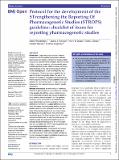Files in this item
Protocol for the development of the STrengthening the Reporting of Pharmacogenetic Studies (STROPS) guideline : checklist of items for reporting pharmacogenetic studies
Item metadata
| dc.contributor.author | Richardson, Marty | |
| dc.contributor.author | Kirkham, Jamie J. | |
| dc.contributor.author | Dwan, Kerry M. | |
| dc.contributor.author | Sloan, Derek J. | |
| dc.contributor.author | Davies, Geraint | |
| dc.contributor.author | Jorgensen, Andrea | |
| dc.date.accessioned | 2019-08-09T12:30:02Z | |
| dc.date.available | 2019-08-09T12:30:02Z | |
| dc.date.issued | 2019-07-11 | |
| dc.identifier | 260484510 | |
| dc.identifier | 1178712d-e312-4395-8cfa-77692e33e1ba | |
| dc.identifier | 85069483047 | |
| dc.identifier | 31300508 | |
| dc.identifier | 000485269700253 | |
| dc.identifier.citation | Richardson , M , Kirkham , J J , Dwan , K M , Sloan , D J , Davies , G & Jorgensen , A 2019 , ' Protocol for the development of the STrengthening the Reporting of Pharmacogenetic Studies (STROPS) guideline : checklist of items for reporting pharmacogenetic studies ' , BMJ Open , vol. 9 , no. 7 , e030212 . https://doi.org/10.1136/bmjopen-2019-030212 | en |
| dc.identifier.issn | 2044-6055 | |
| dc.identifier.other | ORCID: /0000-0002-7888-5449/work/60631021 | |
| dc.identifier.uri | https://hdl.handle.net/10023/18285 | |
| dc.description | MR is supported partly by Liverpool Reviews and Implementation Group (LRiG, based at the University of Liverpool), based on funding from the National Institute for Health Research Health Technology Assessment Programme (URL, http://www.nets.nihr.ac.uk/programmes/hta), and partly by the Research, Evidence and Development Initiative (READ-It) project. READ-It (project number 300342-104) is funded by UK aid from the UK government. | en |
| dc.description.abstract | Introduction: Large sample sizes are often required to detect statistically significant associations between pharmacogenetic markers and treatment response. Meta-analysis may be performed to synthesise data from several studies, increasing sample size and consequently power to detect significant genetic effects. However, performing robust synthesis of data from pharmacogenetic studies is often challenging due to poor reporting of key data in study reports. There is currently no guideline for the reporting of pharmacogenetic studies. The aim of this project is to develop the STrengthening the Reporting Of Pharmacogenetic Studies (STROPS) guideline. The STROPS guideline will facilitate the conduct of high-quality meta-analyses and thus improve the power to detect genetic associations. Methods and analysis: We will establish a preliminary checklist of reporting items to be considered for inclusion in the guideline. We will then conduct a Delphi survey of key stakeholder groups to gain consensus opinion on which reporting items to include in the final guideline. The Delphi survey will consist of two rounds: the first round will invite participants to score items from the preliminary checklist and to suggest additional relevant items; the second round will provide feedback from the previous round and invite participants to re-score the items. Following the second round, we will summarise the distribution of scores for each item, stratified by stakeholder group. The Steering Committee for the project and representatives from the key stakeholder groups will meet to consider the results of the Delphi survey and to finalise the list of reporting items. We will then draft, pilot-test and publish the STROPS reporting guideline and accompanying explanatory document. Ethics and dissemination: The University of Liverpool Ethics Committee has confirmed ethical approval for this study (reference: 3586). Dissemination activities will include presenting the reporting guideline at conferences relevant to pharmacogenetic research. | |
| dc.format.extent | 5 | |
| dc.format.extent | 245976 | |
| dc.language.iso | eng | |
| dc.relation.ispartof | BMJ Open | en |
| dc.subject | RA0421 Public health. Hygiene. Preventive Medicine | en |
| dc.subject | Medicine(all) | en |
| dc.subject | T-NDAS | en |
| dc.subject | SDG 3 - Good Health and Well-being | en |
| dc.subject.lcc | RA0421 | en |
| dc.title | Protocol for the development of the STrengthening the Reporting of Pharmacogenetic Studies (STROPS) guideline : checklist of items for reporting pharmacogenetic studies | en |
| dc.type | Journal article | en |
| dc.contributor.institution | University of St Andrews. Infection and Global Health Division | en |
| dc.contributor.institution | University of St Andrews. School of Medicine | en |
| dc.identifier.doi | 10.1136/bmjopen-2019-030212 | |
| dc.description.status | Peer reviewed | en |
This item appears in the following Collection(s)
Items in the St Andrews Research Repository are protected by copyright, with all rights reserved, unless otherwise indicated.

